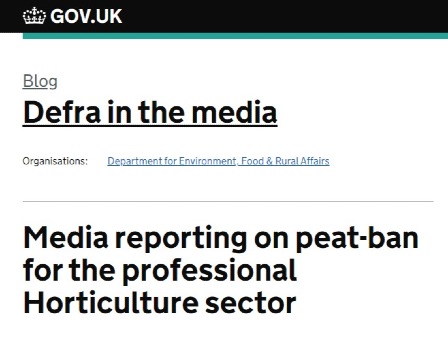
Following media stories, some of which are included in this issue of GTN Xtra, about further developments on the peat-ban, the Defra Press Office issued the following Blog on Friday 24th March:
There has been news reporting of our ban on horticultural peat. In 2011 we agreed to a voluntary phase out of the sale of peat and peat-containing products by 2020, and repeatedly stated that we would legislate if this was not successful. While progress was made, the industry transition has been too slow. Therefore, in August 2022, we announced a ban on the sale of peat and peat-containing products in the retail horticultural sector by 2024.
The retail sector accounts for 70% of peat sold in the UK. The professional sector also utilises peat to grow some food products and plants ranging from oaks to rarer species. There are already many peat alternatives on the market including bark, coir, bracken which have been well adopted in the amateur sector. Defra has jointly funded research with the industry on peat replacements in professional horticulture, the results of which are promising. Indeed sectors such as strawberries and other soft fruit growers have already transitioned away from peat-based growing media.
However, the sector has raised concerns about the widespread availability of these products. This week we set out further details to the professional horticultural sector and our expectations for a phased reduction in the use of peat with a date of 2026 - allowing for certain technical exemptions – with a complete ban from 2030.
A phased approach will enable professional horticulture businesses to conduct further commercial scale trials to identify suitable peat-free growing media, in particular for challenging plants, allow time for adaptation and replacement of commercial growing systems and to allow plants already started in a peat containing growing media to work their way through the supply chain.
The exemptions include:
- Technical exemptions for production of young plants in plugs with a maximum volume of 150ml and the production of edible mushrooms with a peat casing layer of 2cm. As our understanding of the technical difficulties improves then this may also include other plant types or production methods where peat cannot be readily replaced.
- Conservation exemptions: It will be necessary to ensure that peat continues to be available for the safeguarding of vulnerable or endangered plant species where it is unclear whether a peat free growing media and no other reliable growing media. This exemption will not be time limited.
At all times we have considered the views of stakeholders on both sides of the argument, seeking to protect our precious peatlands, our largest carbon store, while acknowledging the difficulties the industry face in making such a change.
A Defra spokesperson said: "We have repeatedly stated that if the voluntary targets to phase out the horticultural use of peat, set in 2011, were not successful then we would need to legislate. Our peatlands are our largest carbon store as well as a uniquely valuable habitat. Our approach has sought to achieve our commitments to restore our peatlands while acknowledging the challenges faced by the horticulture sector in transitioning over the last 10 years.
"We believe that a ban in the amateur sector for 2024, which accounts for 70% of use, is still the right approach. Furthermore, we feel that a phased approach for the professional sector with some exemptions from 2026 and a full ban from 2030, is achievable given the number of peat alternatives available and the period of time permitted for the sector to adjust."